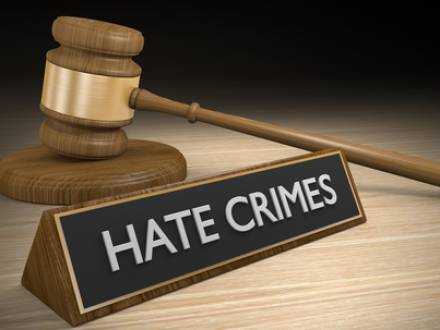Increase in Illinois Hate Crime Triggers Police Education Bill
 The state of Illinois has witnessed a significant increase in hate crimes over the past couple of years, which a new Illinois bill attempts to address. While there are currently several laws on the books that address hate crimes, the Illinois Commission on Discrimination and Hate Crimes has concluded that police officers often fail to recognize hate crimes as an element of another criminal offense.
The state of Illinois has witnessed a significant increase in hate crimes over the past couple of years, which a new Illinois bill attempts to address. While there are currently several laws on the books that address hate crimes, the Illinois Commission on Discrimination and Hate Crimes has concluded that police officers often fail to recognize hate crimes as an element of another criminal offense.
Across the nation, hate crimes have also increased, with the FBI showing 5,479 incidences of hate crimes in 2014 and 11,862 by 2023. In Illinois, there were 109 hate crimes in 2014, but by 2023, that number had grown to 324, nearly tripling. Communities across the state may experience hate and bigotry that does not receive the justice it deserves. In part, this is because law enforcement officials lack the necessary tools to investigate and report hate crimes.
The bill requiring Illinois police officers to receive education and training in recognizing hate crimes unanimously passed the Illinois Senate and is now before the House. If you have been charged with a hate crime in Illinois, you should take the charges very seriously as they are likely in conjunction with another serious crime. Speaking to a Naperville, IL criminal defense attorney is the best step you can take to protect your rights and your future.
What Crimes Can Be Charged as a Hate Crime in Illinois?
Under Illinois law, any of the following crimes can be charged as a hate crime if the crime is motivated by a physical or mental disability, immigration or citizenship status, gender, religion, ancestry, creed, sexual orientation, national origin, color, or race:
- Disorderly conduct
- Trespassing
- Damaging property
- Harassment by phone, social media or email
- Stalking
- Cyberstalking
- Intimidation or making threats
- Theft
- Assault
- Battery
What Are the Penalties for Hate Crimes in Illinois?
A first-time hate crime could result in a person being charged with a Class 4 felony. For a second offense of a hate crime, the charges could be for a Class 2 felony. There are also enhancing factors that can cause the charges to be more serious. If the hate crime occurs within 1,000 feet of a school, mortuary, public park, mosque, synagogue, temple, cemetery, or ethnic community center, there can be enhanced penalties.
A Class 4 felony conviction can result in a sentence of prison for one to three years and a maximum fine of $25,000. A Class 3 felony conviction can result in a sentence of prison for two to five years and a maximum fine of $25,000. A Class 2 felony conviction can result in a sentence of prison for three to seven years and a maximum fine of $25,000. The judge in a hate crime case can also require the defendant to make restitution for the damages suffered by the victim and can order community service.
Are There Defenses to Hate Crime Charges?
The prosecution will attempt to show that the person charged with a hate crime committed a criminal act motivated by hatred, which is a relatively high burden for prosecutors. To defend hate crime charges, the defendant’s attorney may need to provide witnesses who can testify about the defendant's actions or words while he or she was committing the underlying criminal offense. If the prosecution cannot prove the underlying offense, the case for the hate crime cannot move forward.
Contact a DuPage County, IL Criminal Defense Lawyer
If you have been charged with a hate crime – as well as the underlying crime – it is extremely important that you speak to a Naperville, IL criminal defense attorney from Appelman Law LLC. In addition to his law degree, Attorney Appelman has a master’s degree in forensic psychology and always goes the extra mile for his clients. Call 630-717-7801 to schedule your free initial consultation.





